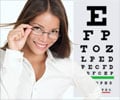
"While many people are aware of the potential damage the sun's UV rays can do to the skin, very few are aware of the damage that can be done to the eyes as a result of overexposure to the sun," said Dr. Feldman. "Research has shown that having light-colored eyes and/or taking certain medications may increase one's risk of UV-related damage to the eyes. It may also make them susceptible to certain eye conditions such as eye cancer and cataracts, which is the number one cause of blindness in the world."
According to a national study involving more than 2,000 adults, it was found that the combination of light eyes and sun exposure can increase the risk of developing rare eye cancers such as melanoma of the iris and other areas of the uveal tract. The study also found that approximately one-third of American adults take medications that can increase their susceptibility to damage from the sun's UV rays, also known as photosensitivity. Of this number, only about half of these adults were aware that medications such as antibiotics with tetracycline, birth control pills, and pain relievers such as ibuprofen and naproxen sodium can cause photosensitivity.
In order to protect the eyes from the sun's harmful UV rays, as well as reduce the risk of developing certain eye disorders and diseases, Dr. Feldman recommends the following:
• Wear appropriate sunglasses – Whenever possible, wear only sunglasses that are labeled as "100% UV protection" or "UV400," as these protect against both UVA and UVB rays. The sunglasses should also wrap around the eyes and face for added protection.
• Wear sunglasses at all times – The word "sunglasses" can be misleading, as some may think they are only meant for the sun. For maximum protection, sunglasses should be worn whether it is sunny or cloudy, as the sun's UV rays have the ability to penetrate through the clouds to burn both the eyes and skin.
Advertisement
• Be aware of surroundings – When out in the sun, it's important to remember that the sun's UV rays can cause harm not only directly but also by reflecting off the sand, water, or pavement.
Advertisement













